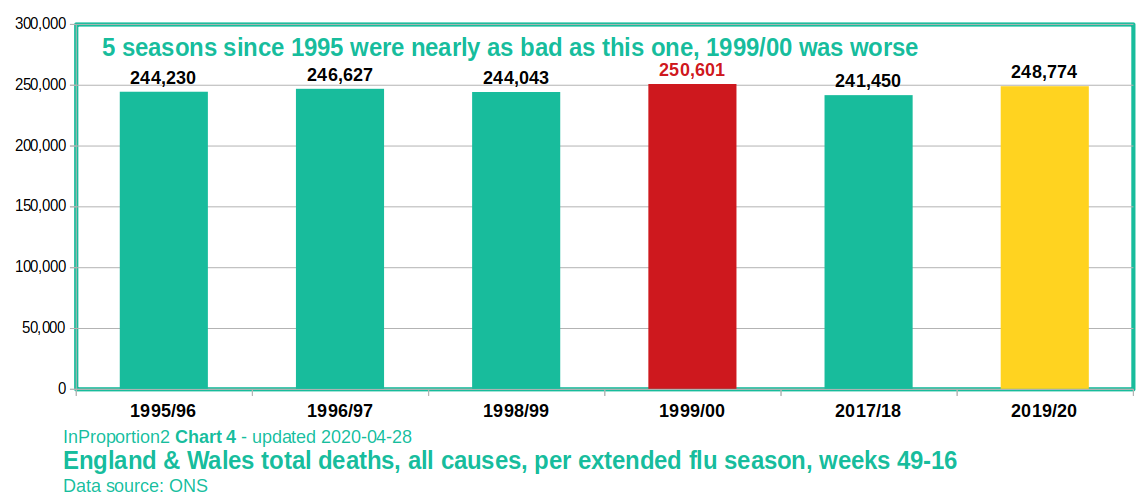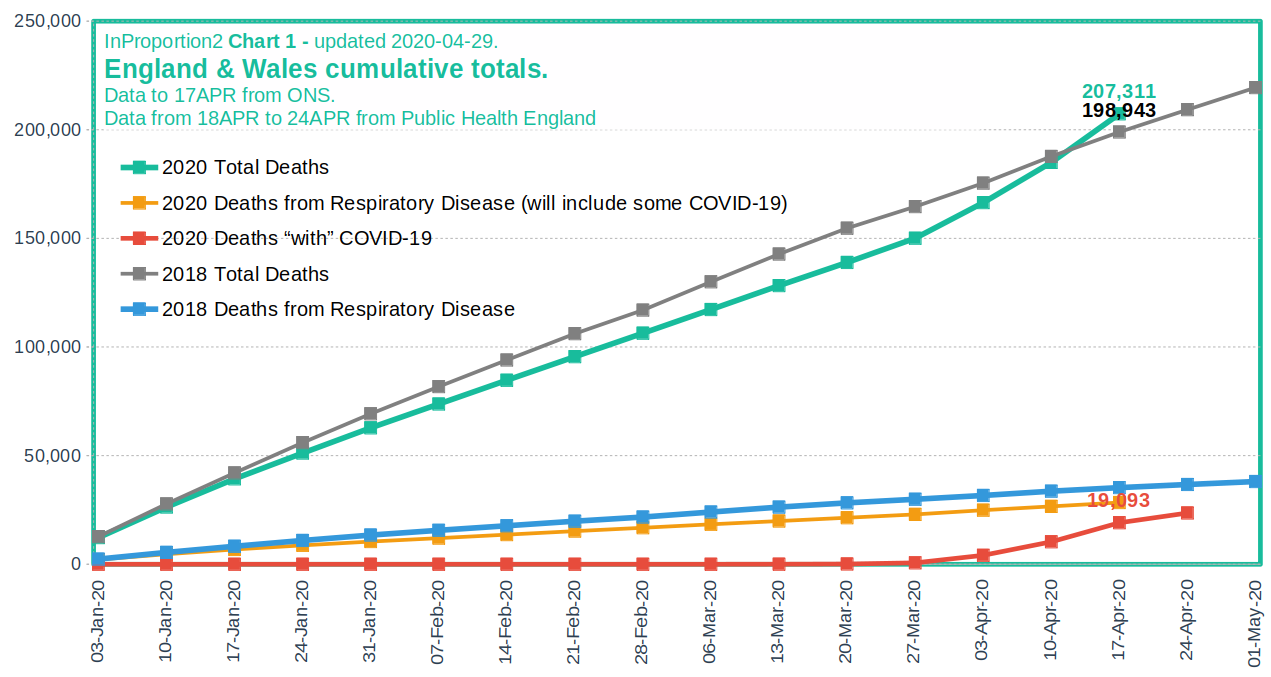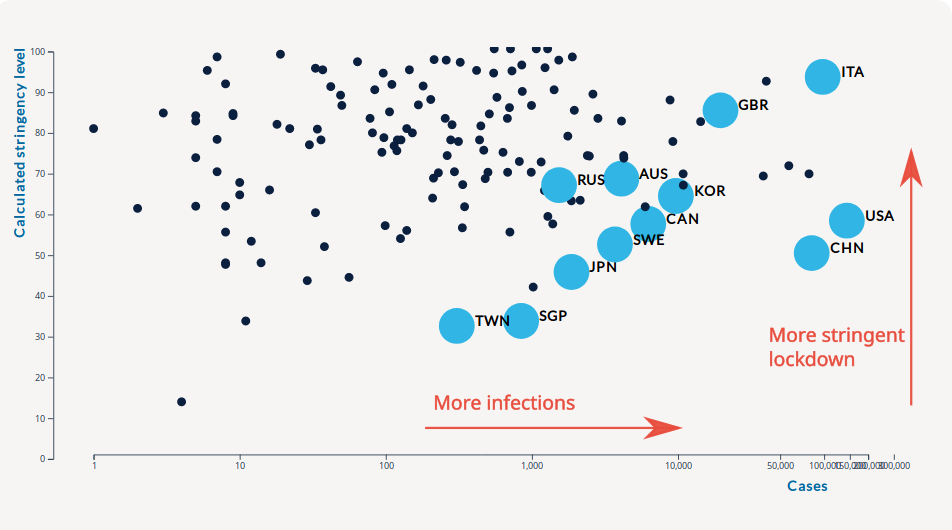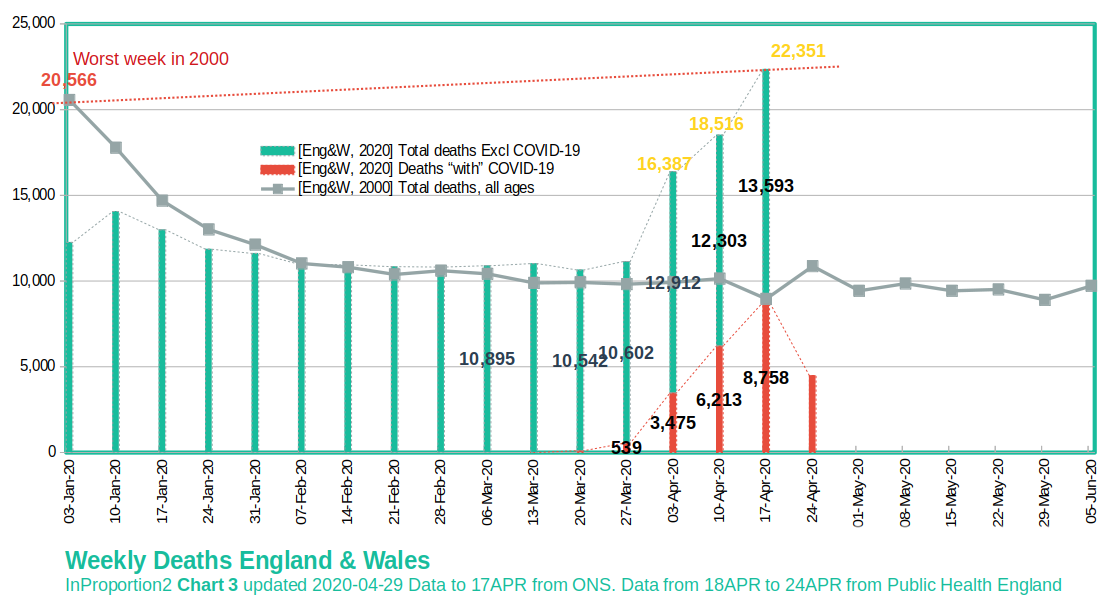Seasonal Flu/respiratory illnesses strike every year. Compared to a typical epidemic, the current Covid-19 pandemic is hitting the UK badly.
However, since 1995 in England and Wales, there have been four seasons that were nearly as bad and one season that was worse (1999/2000) (measured in terms of cumulative deaths, all causes, weeks 49 to 16) - updated 2020-04-28.
Draconian lockdowns were not considered necessary then, why are they now?
For most of 2020 so far, the overall number of people dying has been less than it was in 2018 (a bad year for flu/respiratory disease). The chart below shows that the number of deaths in 2020 has now started to exceed those in 2018 for the same time period - so far by about four per cent.
Much of the media provides a continual stream of sensational headlines about Covid such as "Death tolls soar as ..." or "Worst week since records began for..." but it must be asked if such fear generating approach is justified or helpful.
Note: Updated 2020-04-28 using the latest data released by the Office for National Statistics and Public Health England, complete to 2020-04-17. Numbers will be lower than those given in daily government press releases as all figures here exclude Scotland and Northern Ireland. They also exclude estimated deaths between 2020-04-17 and the most recently announced. Numbers after 2020-04-17 are from Public Health England
The lockdown may not be helping
On 29 April, the UN's International Labour Organisation stated that, due to the lockdowns, nearly half the global workforce is at risk of losing livelihoods. [1].
Those who decide that the lockdown is the right thing to do, need to be very sure that its immense price is worth paying.
If you compare Sweden with the UK, it looks as if the lockdown may not be helping
It is taken by many for granted that the lockdown will save lives by slowing the spread of the virus. This may not be true. In the UK strict lockdown measures were imposed on 2020-03-23. Sweden did not impose a lockdown. Sweden has done well compared the UK.
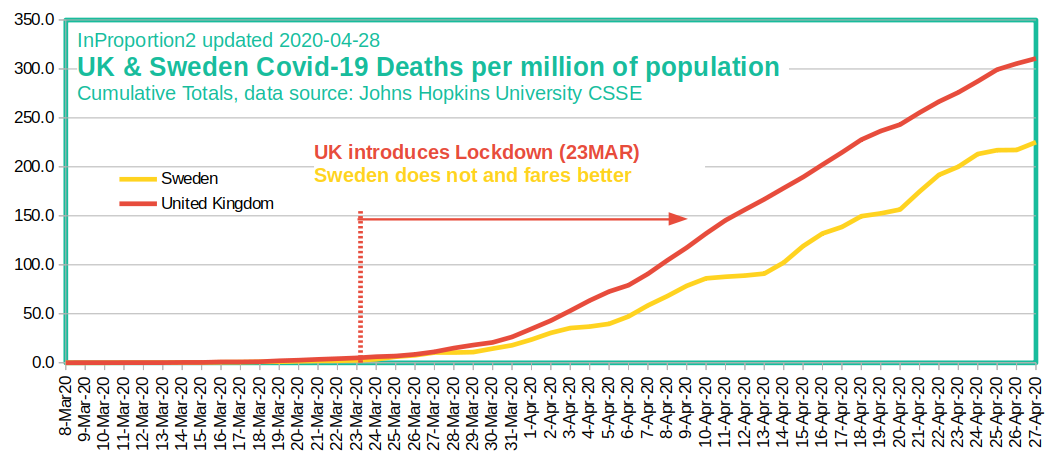
In other countries too, stringent lockdowns tend to be linked to higher infection rates
Sweden may be doing better than the UK because it is less densely populated. It is therefore useful to compare with more countries.
The Oxford University Coronavirus Government Response Tracker compares around 150 countries giving them a stringency score that reflects how strict a country's lockdown measures are. Oxford has plotted the stringency index against the number of Covid-19 cases for that country.
For example, Taiwan (TWN) (at time of writing only 6 Covid-19 deaths, and no deaths in the last week) is associated with one of the least stringent lockdowns [2].
Countries with less stringent lockdown measures do not seem to suffer higher infection rates. In fact the opposite seems to be true.
Many experts advise that strict lockdown is not the best policy

Dr Gérard Krause head of Department for Epidemiology at the Helmholtz Centre for Infection in Braunschweig
"We have to keep these serious social measures as short and as low as possible, because they could potentially cause more illnesses and deaths than the coronavirus itself."
[1]

Professor Dr. Frank Ulrich Montgomery is former President of the German Medical Association and Deputy Chairman of the World Medical Association.
"I’m not a fan of lockdown. Anyone who imposes something like this must also say when and how to pick it up again. ...
Italy has imposed a lockdown and has the opposite effect. They quickly reached their capacity limits, but did not slow down the virus spread within the lockdown."
[3]

Dr Jay Bhattacharya
Dr Eran Bendavid and Dr Jay Bhattacharya are professors of medicine and public health at Stanford University:
"A universal quarantine may not be worth the costs it imposes on the economy, community and individual mental and physical health"
[2]

Dr Richard Schabas is the former Chief Medical Officer of Ontario, Medical Officer of Hastings and Prince Edward Public Health and Chief of Staff at York Central Hospital.
"I am not preaching complacency. This disease is not going away any time soon; we should expect more cases and more local outbreaks...
but we also need to be sensible. Quarantine belongs back in the Middle Ages. Save your masks for robbing banks. Stay calm and carry on. Let’s not make our attempted cures worse than the disease."
[2]

The German Network for Evidence-Based Medicine is an association of about 1000 German scientists, researchers and medical professionals founded to promote evidence-based and patient-oriented medicine
"A Cochrane Review from 2011 found no robust evidence for the effectiveness of border control screenings or social distancing.
...A systematic review from 2015 found moderate evidence that school closures delay the spread of an influenza epidemic, but at high cost.
Isolation at home slows down the spread of influenza but leads to increased infection of family members"
[2]

Dr Anders Tegnell is a Swedish physician and State Epidemiologist of the Public Health Agency of Sweden since 2013.
"Older people or people with previous health problems should be isolated as much as possible. ... That is the one rule. The other is:
Anyone with symptoms should stay at home immediately, even with the slightest cough.
If you follow these two rules, you don’t need any further measures, the effect of which is only very marginal anyway"
[2]

Dr Sucharit Bhakdi is a specialist in microbiology and infection epidemiology. He is emeritus professor at the Johannes Gutenberg University in Mainz.
(The German government’s anti-COVID19 measures) ...
"are grotesque, absurd and very dangerous...The life expectancy of millions is being shortened. The horrifying impact on the world economy threatens the existence of countless people."
[3]

Dr Joe Brownlie CBE BVSc PhD DSc LLD(Hons)
Dr Joe Brownlie is an emeritus professor of veterinary pathology, Department of Pathology and Infectious Diseases at the Royal Veterinary College, London.
Dick Sibley is the director and principal of West Ridge Veterinary Practice in Devon.
[4]"Veterinary surgeons with any experience in dealing with infectious disease and population medicine will be looking at the government’s current management of the Covid-19 epidemic with dismay
It is a strategy not so much to save lives but to delay deaths."
Sources for expert quotations:
Could lockdown be a cause of excess deaths short-term as well as long term?
In the long term, there will be a huge price to pay for the lockdown in terms of damage to the economy and in knock-on effects to health and mortality. Everyone expects this. However, it may be that the impact of the lockdown is already having a measurable impact on mortality!
In the four most recent weeks covered by the ONS data, compared to the 5 year average, an excess of 7,598 deaths occurred not attributed to Covid.
Did some of the 7,598 die as a result of a reduction in the delivery of normal hospital services due to the lockdown? Are thousands already paying for the lockdown with their lives? (See discussion of this here)
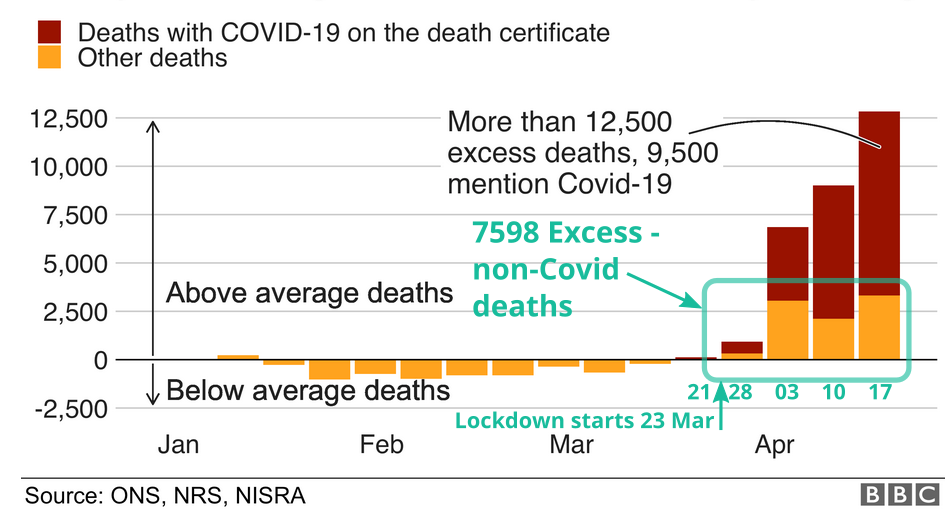
England and Wales.
The following chart shows the proportion of weekly deaths that are due to Covid-19 in the context of total deaths in the same time period during 2000. The worst weekly death total in 2020 is about 8% worse than the worst week in 2000.
It should also be noted that the UK population in 2000 was nearly 10m less than in 2020 (58.8m vs 67.8m). So as a % of these populations, 2000 was very slightly higher. The figures are: 2000: 20,566 deaths/58.8m = 0.0350%, 2020: 22,351 deaths/67.8m = 0.0330%
Is the cure worse than the disease?

To deal with the threat of COVID-19 the UK Government has ordered unprecedented shut-downs and quarantines, and many support this in the spirit of "better safe than sorry". However, this overlooks the fact that shutdowns and quarantines also kill. The economic, social and health costs will almost certainly include:
- Earlier deaths for cancer sufferers due to diagnosis and treatment delays
- Business failures leading to more business failures
- Job losses leading to poor health, social problems and suicides
- Fewer taxpayers available to fund an increasing need for social benefits
- Reduced funding for the NHS and the rest of the public sector
- Lost educational opportunities and disruption to exams and graduations
- Inflation as Government "prints" and "borrows" more, while tax revenues fall
- Pension values reduced by stock-market crashes
- Reduced life expectancy for people moving deeper into poverty
Or in the words of a former UK Supreme Court Judge:
"The real question is, is this serious enough to warrant putting most of our population into house imprisonment, wrecking our economy for an indefinite period, destroying businesses that honest and hard-working people have taken years to build up, saddling future generations with debt, depression, stress, heart attacks, suicides and unbelievable distress inflicted on millions of people who are not especially vulnerable, and will suffer only mild symptoms or none at all?"
“All I maintain is that on this earth there are pestilences and there are victims, and it's up to us, so far as possible, not to join forces with the pestilences.”
Costs for more on the costs of the quarantines and shutdowns.
Updates for general updates.
#InProportion2 for comments and questions
Follow @InProportion2 for updates
